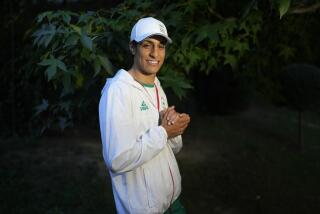Arm-Wrestling Federation Tries to Tone Up Sport’s Image
- Share via
CAIRO — They glared at each other across the table--the Egyptian on one side, the Israeli on the other, chins jutting defiantly and legs braced.
But they were not negotiating peace or talking politics; they were waiting for the starter’s signal.
The referee forced their clenched fists, drenched in chalk and streaked with sweat, into position. The Egyptian jerked his hand aside in protest, wheeled away and paced the floor before returning to the table.
The mood at the Cairo stadium intensified. Rowdy army cadets and other spectators whistled and clapped from the grandstands and the two arm-wrestlers bent their heads to hear the referee. Then they edged up to the table again and the crowd went wild, cheering for the Egyptian. “Go!” they roared.
Forearms bulging and legs trembling, Mahmoud Barakat and Shai Ben-Shahar clasped hands and grimaced as they strained in stubborn deadlock. Slowly, the Israeli twisted Barakat’s wrist to the side and forced it to the table.
Boos and catcalls echoed in the hall as Ben-Shahar walked to the judge’s panel to record his victory in the 1998 World Arm Sport Federation world championship. “He tried to get an illegal hold on me,” a dejected Barakat claimed after his defeat. Israeli coach Ben-Zion Bayer said: “They don’t like it when we win, but we do it anyway.”
No one talked politics when the world’s top arm-wrestlers met at the championships Nov. 4 to 6. Israelis got to grips with Arabs, Russians with Americans. And Egypt’s female arm-wrestlers showed that a fierce will to win lay behind the Islamic veils most of them wore.
“In no world championship has any nation fielded so many ladies as Egypt,” said World Arm Sport Federation Secretary General Barij Barandas.
The Russians won the tournament and Georgia placed second.
The Calcutta-based federation, founded more than 30 years ago by an American, brings together male and female arm-wrestlers from more than 70 member countries. And they want respect.
“The mistaken belief is that arm-wrestling is a low-life, down in the gutter, barroom sport,” said Frank Bean, a federation official from Tennessee. “But it’s wonderful. One on one.”
The federation, pursuing international recognition, has applied to the General Assembly of International Sports Federations and the International Olympic Committee.
When arm-wrestlers from about 30 countries aligned elbows on chest-high tables in Cairo, they made sure the playing field was level. “We’re one big family,” said referee Karen Bean.
An Armenian coach mumbled and made the sign of the cross as his burly protege strained to hold off a giant American preacher. Moments after the American slammed his arm to the table, he consoled his opponent with a gentle handshake.
“I do that all the time,” said Bobby Hopkins, a minister from Florida. “My physical being opens their eyes and when I shake hands it is an example to youth to do the right thing.”
Egyptian spectators, from a society that expects women to behave with Islamic decorum, got a taste of Italian exuberance when Patrizia DeAngelli downed her opponent. Whooping loudly, she hoisted the Italian flag on a victory lap and hurled herself into the arms of her male coaches, leaping up and wrapping her legs around them.
Egyptian army cadets burst into cheers as she dashed into the stands to kiss spectators. And Egyptian teenagers leaned over the rails and shrieked for the attention of Israeli arm-wrestler Joe Fink as he waited to compete, old socks pulled to his elbows to warm his forearms.
“I have no idea what they’re saying,” said Fink, who earns a living guarding Jewish settlements in Israel.
Israeli coach Bayer showed a reporter a picture of himself in Israel huddled with U.S. Ambassador Edward Walker, their hands clamped in a mock arm-wrestling grip. “He told me he wants to learn because he arm-wrestles all the time with Netanyahu and Arafat,” said Bayer, referring to the Israeli prime minister and Palestinian leader.
Ben-Shahar said he arranges wedding parties when he is not crushing foes with his 18-inch biceps. “I’m a very sweet man,” he said, after posing for pictures for Egyptian girls.
Sweetness is not a quality opponents would immediately detect in some of the stars of Egypt’s 40-strong women’s team--not in Hoda Ahmed, a veiled middle-aged mother of two whose steely muscles have earned her the nickname “The Arm Breaker,” nor in the eyes of Aza Abdel Bedia, who said: “I look my opponent in the face. If I see fear, I think maybe I can win.”
Just ask master-class wrestler Souheer Exandar about making inroads in a male-dominated sport. “Women go to the moon,” she said. “I like difficulty. It makes me believe in myself.”
Egyptian women’s coach Amal Ahmed said her charges spend several hours a day weightlifting and improving their technique. Flexing their biceps for a reporter to squeeze, they brushed off perceptions of Muslim women as submissive.
One 18-year-old Egyptian woman in particular was the picture of determination as she climbed awkwardly onto the scales to be weighed by a referee before the tournament.
“I’m Yasmin Ahmed,” she declared proudly. “Blind.”
Women in Egypt, who have broken ground in other sports such as soccer, often seen in the Arab world as reserved for men, may grit their teeth when 41-year-old American James Battles explains why he arm-wrestles. “Because I’m a guy,” he said.
More to Read
Go beyond the scoreboard
Get the latest on L.A.'s teams in the daily Sports Report newsletter.
You may occasionally receive promotional content from the Los Angeles Times.










